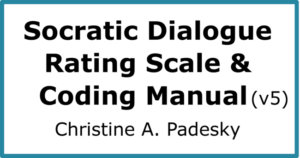Clinical Tools
apply your knowledge and stay current with evidence-based practice
100% free of charge
Trusted Knowledge
Anytime
Anywhere

Dear Colleagues
We are happy to provide the following clinical tools for your personal use in either therapy or research. Read colleagues feedback.
Please note: these materials are protected by copyright so make sure you make no alterations and always include the author, source and copyright notice. We appreciate your adherence to copyright law and the protection of intellectual property.
permissions and use restrictions
- You MAY link to the following web address: https://www.padesky.com/clinical-corner/
- You DO NOT HAVE PERMISSION to link to an individual clinical tool (it may be moved about during re-designs or page revisions)
- You DO NOT HAVE PERMISSION to post our clinical tools on other sites (including Mind Over Mood worksheets).
- Clinicians and researchers are welcome to use these tools in their clinical or research setting.
- Viewing or printing pdf forms requires a pdf reader. A free pdf reader can be downloaded to your computer or mobile unit by clicking on one of the following links: Get Adobe Reader. Before downloading, make sure you check or uncheck the optional offers.
- Mind Over Mood worksheets have their own specific permissions for the public for personal use and for therapists using them with their clients. These permissions are stated on the back of the title page and at the bottom of page vi.
Mind Over Mood Worksheet permissions: [from the publisher] “Purchasers of this book have permission to copy worksheets and boxes, where indicated, for personal use or use with individual clients.” From page vi: “Purchasers of this book can download and print additional copies of the [MOM2] worksheets for personal use or use with individual clients.” [publisher’s link provided on page vi.]
REFERENCES FROM ...
Reimaging CBT Therapist Training Through the Lens of Experience

The following are references mentioned in Dr. Padesky’s virtual one hour Invited Address presented to the attendees of the 10th World Congress of Cognitive and Behavioral Therapies in Seoul, KOREA on June 3, 2023.
FOR a 30% DISCOUNT on the 2023 Dialogues for Discovery book by Padesky & Kennerley (Eds), use the following steps:
- Visit the Oxford Press web address listed below. Please note, slow loading times on their website.
https://global.oup.com/academic/ - In the Search Box, enter the following ISBN number: 9780199586981
- Press SEARCH. This takes you to the book description page.
- Click on ADD to CART.
- Enter the following discount code in the Shopping Cart before checkout: ASPROMP8
- Once you click on PROCEED to CHECKOUT, site registration is required however once you provide the required information, the site should then convert to the currency used in your location and adjust the shipping prices accordingly.
Reimaging CBT Therapist Training Through the Lens of Experience
The following are references mentioned in Dr. Padesky’s virtual one hour Invited Address presented to the attendees of the 10th World Congress of Cognitive and Behavioral Therapies in Seoul, KOREA on June 3, 2023.
- Two chapters to simply teach anxiety disorder treatments:
Padesky, C. A. (2020). The Clinician’s Guide to CBT Using Mind Over Mood. Guilford Publications.
James Bennett-Levy highlights the three types of knowledge that a therapist needs to develop:
Bennett-Levy, J. (2006). Therapist Skills: A Cognitive Model of their Acquisition and Refinement. Behavioural and Cognitive Psychotherapy, 34(1), 57-78. doi:10.1017/S1352465805002420
Education research suggests other ways of making learning more memorable …. show greater learning gains when they are given an organizational structure in which to fit new knowledge:
Lovett, M. C., Bridges, M. W., DiPietro, M., Ambrose, S. A., & Norman, M. K. (2023). How Learning Works: Eight Research-based Principles for Smart Teaching. John Wiley & Sons.
4-Stage Model of Socratic Dialogue:
(reprint available from – see Socratic Dialogue section) https://www.padesky.com/clinical-corner/publications/
Padesky, C.A. (1993, September). Socratic questioning: Changing minds or guiding discovery? Keynote address presented at the 1993 European Congress of Behaviour and Cognitive Therapies, London UK.Padesky, C.A. (2019, July 18). Action, dialogue & discovery: Reflections on Socratic questioning 25 years later. Keynote address presented at the 2019 World Congress of Cognitive and Behavioural Therapies, Berlin GERMANY.
Socratic Dialogue Manual and Rating Scale:
Padesky, C.A. (2020). Socratic dialogue rating scale and coding manual. Retrieve from https://www.padesky.com/clinical-corner/clinical-tools/ (see socratic dialogue section)
Research demonstrates that learner’s sense of belonging, the sense that they fit in with their learning environment, has a big impact on their ability to learn and succeed:
Braxton, J. (2012). Reworking the student departure puzzle. Vanderbilt University Press.
Tinto, V. (2012). Completing college: Rethinking institutional action. University of Chicago Press.
Walton, G. M., & Cohen, G. L. (2011). A brief social‐belonging intervention improves academic and health outcomes of minority students. Science, 331(6023), 1447–1451.
Empirical studies show that gender diversity is linked to innovation:
Díaz‐García, C., González‐Moreno, A., & Sáez‐Martínez, F. J. (2013). Gender diversity within R&D teams: Its impact on radicalness of innovation. Innovation, 15(2), 149–160.
Nathan, M., & Lee, N. (2013). Cultural diversity, innovation, and entrepreneurship: Firm‐level evidence from London. Economic Geography, 89(4), 367–394.
Diversity within a group of problem solvers matters more than their individual ability:
Page, S. (2008). The difference: How the power of diversity creates better groups, firms, schools, and societies. Princeton University Press.
Suggests the more women there are in a group, the more likely it is that all team members ideas will be heard and incorporated:
Woolley, A., & Malone, T. (2011). What makes a team smarter? More women. Harvard Business Review, 89(6), 32–33.
Actual skills practice (in role plays or clinical situations) has six times the learning value of reading text or watching videos:
Koedinger, K. R., Kim, J., Jia, J. Z., McLaughlin, E. A., & Bier, N. L. (2015). Learning is not a spectator sport: Doing is better than watching for learning from a MOOC. Proceedings of the Second ACM Conference on Learning @ Scale (pp. 111–120). Association for Computing Machinery.
Completing reflection worksheets increased therapist awareness and use of the workshop skills taught:
Bennett-Levy, J. & Padesky, C.A. (2013). Use it or lose it: Post-workshop reflection enhances learning and utilization of CBT skills. Cognitive and Behavioral Practice, 21(1), 12-19.
Entire field devoted to multimedia design principles. For example:
Clark, R. C., & Mayer, R. E. (2016). e‐Learning and the science of instruction: Proven guidelines for consumers and designers of multimedia learning (4th ed.). Wiley.
2023 Book: Dialogues for Discovery:
- Padesky, C.A. and Kennerley, H. (Eds.) (2023) Dialogues for discovery: Improving psychotherapy’s effectiveness. Oxford University Press.
FOR a 30% DISCOUNT, visit the Oxford Press web address listed below. Please note, slow loading times on their website.
https://global.oup.com/academic/
In the Search Box, enter the ISBN number: 9780199586981
Press SEARCH. This takes you to the book description page. Click on ADD to CART.
Enter the following discount code in the Shopping Cart before checkout: ASPROMP8
Once you click on PROCEED to CHECKOUT, site registration is required however once you provide the required information, the site should then convert to the currency used in your location and adjust the shipping prices accordingly.
- - - - - - - - - -
mom2 exercise
activity scheduling exercise
Activity Scheduling Exercise from Mind Over Mood Second Edition 2016 page 213.
Watch our YouTube video for tips on how to use.
Copyright 2016 Dennis Greenberger and Christine A Padesky. All rights reserved. Published on Clinical Tools with permission of the publisher Guilford Press.
* Therapists have permission to email this worksheet to their clients.*
mom2 worksheet 13.6
activity schedule worksheet
Activity Schedule Worksheet 13.6 from Mind Over Mood Second Edition 2016 pages 214-215.
Watch our YouTube video for tips on how to use.
Copyright 2016 Dennis Greenberger and Christine A Padesky. All rights reserved. Published on Clinical Tools with permission of the publisher Guilford Press.
* Therapists have permission to email this worksheet to their clients.*
mom2 worksheet 15.1
measuring and tracking my moods
Measuring and Tracking My Moods Worksheet 15.1 from Mind Over Mood Second Edition 2016 page 253.
Watch our YouTube video for tips on how to use with mood, behavior, and other types of therapy goals.
Copyright 2016 Dennis Greenberger and Christine A Padesky. All rights reserved. Published on Clinical Tools with permission of the publisher Guilford Press.
* Therapists have permission to email this worksheet to their clients.*
Scan below
for more clinical tools
conceptualization scale
collaborative case conceptualization rating scale
The Collaborative Case Conceptualization rating scale (CCCRS) and manual operationalize the model of case conceptualization developed by Kuyken, Padesky and Dudley (2009) in their book Collaborative Case Conceptualization: Working Effectively with Clients in Cognitive Behavioral Therapy. These copyrighted items are available for personal use by supervisors, researchers, instructors, and therapists.
Reference: Assessing Competence in Collaborative Case Conceptualization: Development and Preliminary Psychometric Properties of the Collaborative Case Conceptualization Rating Scale (CCC-RS) by Kuyken, Beshai, Dudley, Abel, Görg, Gower, McManus, & Padesky
Socratic Dialogue
Socratic Dialogue Rating Scale and Coding Manual (2020)

Socratic Dialogue Rating Form
Contains self and rater scoring for each item as well as space to highlight strengths and improvement needed.
supervision worksheet
supervision / consultation worksheet
Designed and developed by Christine A. Padesky, PhD in 1995. To be used by clinicians seeking CBT consultation / supervision.
INTENT: to help the clinician identify what they know and what might be contributing to feeling stuck. This form requires them to prepare for their session ahead of time and focus more clearly on the critical issues.
PROCESS: the clinician is asked to formulate a “Supervision Question” and then proceed through the form providing information directly relevant to the question at hand. This form is then presented during the consultation or supervision session.
